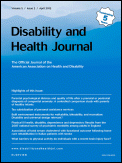
Disability and Health Journal
Scope & Guideline
Bridging the gap between health and disability research.
Introduction
Aims and Scopes
- Health Outcomes and Access:
Investigates the health outcomes of individuals with disabilities, including access to medical care, healthcare disparities, and the impact of various health conditions on overall well-being. - Intervention Development and Evaluation:
Focuses on the development, implementation, and evaluation of interventions aimed at improving health and quality of life for individuals with disabilities, including physical activity programs, nutritional interventions, and mental health support. - Social Participation and Inclusion:
Explores the social dimensions of disability, including barriers to participation in community life, the effects of social support, and strategies to promote inclusion in various settings. - Policy and Advocacy:
Examines the role of policy in shaping the experiences of individuals with disabilities, advocating for changes that enhance accessibility and equity in health and social services. - Research Methodologies:
Utilizes diverse research methodologies, including qualitative, quantitative, and mixed-methods approaches, to capture the complexities of disability experiences and inform evidence-based practices.
Trending and Emerging
- Impact of COVID-19 on Disability:
Research exploring the effects of the COVID-19 pandemic on individuals with disabilities has surged, highlighting challenges related to healthcare access, social isolation, and mental health. - Mental Health and Disability:
There is an increasing emphasis on mental health issues among individuals with disabilities, including the interplay between physical health, mental well-being, and access to mental health services. - Technology and Digital Health Interventions:
The rise of digital health solutions and telehealth services tailored for individuals with disabilities is becoming a prominent area of research, focusing on accessibility, usability, and effectiveness. - Intersectionality in Disability Research:
Emerging studies are increasingly addressing the intersection of disability with other identities, such as race, gender, and socioeconomic status, to better understand diverse experiences and needs. - Community-Based Participatory Research (CBPR):
There is a growing trend towards community-based participatory research approaches that involve individuals with disabilities in the research process, ensuring their voices and perspectives shape the research agenda.
Declining or Waning
- Traditional Disability Models:
There is a noticeable decrease in research focused solely on traditional medical models of disability, with a shift towards more holistic and social models that emphasize rights, inclusion, and quality of life. - General Population Comparisons:
Research comparing individuals with disabilities to the general population is becoming less frequent, as the focus shifts toward understanding the unique experiences and needs of those with disabilities without constant comparison. - Longitudinal Studies on Disability Trends:
While longitudinal studies are valuable, there seems to be a decline in such studies focusing on disability trends over time, possibly due to the challenges in securing funding and participant retention. - Single-Dimensional Health Studies:
Research that examines health outcomes in a siloed manner, without considering the interplay of social, psychological, and environmental factors, is becoming less common as interdisciplinary approaches gain traction. - Historical Disability Research:
There is a waning interest in historical analyses of disability, as contemporary issues and current data take precedence in discussions related to health and disability.
Similar Journals

MILBANK QUARTERLY
Pioneering Analysis for a Healthier TomorrowThe Milbank Quarterly is a preeminent scholarly journal published by Wiley that focuses on a range of vital issues in health policy and public health. With an impressive impact factor underscored by its Q1 rankings in both health policy and public health, the journal serves as an essential resource for researchers and professionals seeking to influence health systems and policies on a global scale. Since its establishment in 1986, The Milbank Quarterly has maintained a commitment to rigorous research and innovative analysis, and it continues to provide a platform for groundbreaking studies that address contemporary challenges in health care. Although it does not currently offer open access, the journal features a comprehensive review process that ensures the publication of high-quality articles aiming to inform policy decisions and elevate public health practices, confirming its status within the top ranks of its field.

COMMUNITY MENTAL HEALTH JOURNAL
Exploring the intersection of research and community mental health.Community Mental Health Journal is a leading publication in the field of mental health, managed by Springer and based in the United States. Since its inception in 1965, this journal has provided a critical platform for advancements in mental health research and community practices, with a convergence set to continue until 2024. It boasts an impressive impact factor and ranks in the first quartile (Q1) for Health (Social Science) as well as Public Health, Environmental and Occupational Health, underscoring its significance in interdisciplinary scholarship. The journal caters to a diverse audience, including researchers, practitioners, and students, fostering a deeper understanding of community mental health issues. With a commitment to highlighting innovative research and practical applications, the Community Mental Health Journal serves as an invaluable resource for those dedicated to improving mental health outcomes in communities globally.
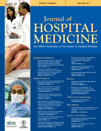
Journal of Hospital Medicine
Driving excellence in hospital care with cutting-edge research.Welcome to the Journal of Hospital Medicine, a leading resource in the field of hospital-based care, published by John Wiley & Sons Inc. Since its inception in 2006, this journal has established itself as an essential platform for advancing knowledge and practice in the areas of assessment and diagnosis, care planning, fundamentals and skills, leadership and management, and health policy. With a commendable Q1 categorization in multiple nursing disciplines and influential rankings in internal medicine, the Journal of Hospital Medicine offers robust insights for healthcare professionals, researchers, and students alike. The journal's commitment to high-impact scholarship is reflected in its prestigious Scopus rankings, positioning it among the top publications in the nursing and medical fields. Aligned with contemporary healthcare challenges and innovations, it aims to not only disseminate cutting-edge research but also to foster collaborative discussions that drive improved patient outcomes. Join us in exploring the critical developments that define modern hospital medicine through this esteemed publication.
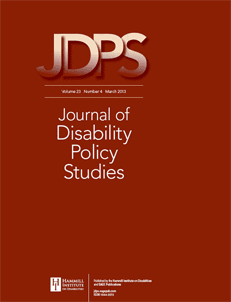
Journal of Disability Policy Studies
Innovating disability policy through scholarly discourse.The Journal of Disability Policy Studies, published by SAGE Publications Inc, stands as a pivotal scholarly resource in the field of disability studies, intersecting the domains of health and law. Established in 1990, this peer-reviewed journal has cultivated a rich legacy of disseminating high-quality research, evidenced by its impressive rankings within the Q2 and Q1 quartiles respectively in Health (Social Science) and Law as of 2023. With a significant impact factor reflected in its Scopus rankings, positioning it in the 88th percentile in Law and the 60th percentile in Health, the journal serves as an essential platform for scholars and practitioners dedicated to advancing the nuanced understanding of policy issues affecting individuals with disabilities. The journal not only stimulates academic discourse but also provides valuable insights aimed at informing policy development and implementation, making it an indispensable resource for researchers, professionals, and students alike.
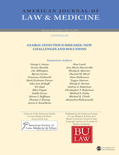
AMERICAN JOURNAL OF LAW & MEDICINE
Fostering Critical Conversations at the Intersection of Law and MedicineAMERICAN JOURNAL OF LAW & MEDICINE is a prestigious interdisciplinary journal published by Cambridge University Press that bridges the critical intersection of legal and medical scholarship. Since its inception in 1975, this journal has fostered scholarly dialogue surrounding complex legal issues affecting health care and medical ethics, significantly contributing to the fields of law and the social sciences. With its current impact factor highlights showcasing a Q2 ranking in Law and Q3 in Health (Social Science), along with a solid readership base, the journal appeals to researchers, legal professionals, and students alike, offering a platform for impactful research and case studies. Although it does not currently provide Open Access options, the journal continues to prioritize rigorous peer-reviewed content, ensuring that essential discussions on law and medicine remain accessible to its readership. By engaging with contemporary legal and medical issues, the AMERICAN JOURNAL OF LAW & MEDICINE plays a vital role in advancing knowledge and shaping practices within these dynamic fields.

SUPPORTIVE CARE IN CANCER
Empowering healthcare professionals in oncology support.SUPPORTIVE CARE IN CANCER is a premier academic journal published by Springer, dedicated to advancing the understanding and management of supportive care for cancer patients. With a notable impact factor, the journal is recognized for its contribution to the fields of Oncology, Rehabilitation, and Nursing, achieving impressive rankings in Scopus, including Q1 for Oncology Nursing and Rehabilitation, and Q2 for general Oncology. Founded in 1993 and looking towards a promising future until 2024, it serves as a vital resource for researchers, professionals, and students engaged in these critical areas of healthcare. Although not an Open Access journal, its rigorous peer-reviewed articles provide valuable insights into innovative practices and evidence-based strategies that enhance patient quality of life during and after treatment. By bridging the gap between research and clinical practice, SUPPORTIVE CARE IN CANCER significantly influences patient outcomes and fosters interdisciplinary collaboration in patient support.
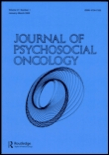
JOURNAL OF PSYCHOSOCIAL ONCOLOGY
Bridging disciplines to enhance cancer patient well-being.JOURNAL OF PSYCHOSOCIAL ONCOLOGY, published by Routledge Journals, Taylor & Francis Ltd, serves as a pivotal platform in the interdisciplinary field of psychosocial oncology, providing critical insights into the psychological, social, and emotional aspects impacting cancer patients and their families. With a storied history dating back to 1983 and converging until 2024, this journal holds a prestigious positioning, ranked in the Q2 category for Applied Psychology and Q3 for both Oncology and Psychiatry & Mental Health in 2023, highlighting its integral role in these overlapping fields. Despite not currently offering an open access model, the journal continues to attract a broad spectrum of scholars with its impactful research, evidenced by its Scopus rankings within the 50th to 58th percentile across related categories. Researchers, clinicians, and students alike will find the journal’s focus on the psychosocial dimensions of cancer to be invaluable, as it advances knowledge and practice aimed at improving patient outcomes and well-being in the cancer care continuum.
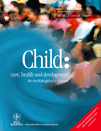
CHILD CARE HEALTH AND DEVELOPMENT
Pioneering research for nurturing young minds.Child Care Health and Development is a prestigious journal published by Wiley, dedicated to advancing the fields of child health and developmental psychology. With a rich publication history spanning from 1975 to 2024, this journal holds significant influence and credibility, illustrated by its impressive ranking in diverse categories such as Q1 in Pediatrics, Perinatology and Child Health and Q2 in Developmental and Educational Psychology as of 2023. The journal serves as an essential platform for researchers, practitioners, and students, promoting interdisciplinary studies that address pressing issues in child care, health, and development. While currently not an open-access journal, it still provides critical insights into public health and environmental factors affecting children, evidenced by its Scopus rankings. The journal is published in the United Kingdom and continues to impact the academic community by fostering knowledge dissemination and supporting practices that enhance the welfare of children globally.

Palaestra
Bridging theory and practice for a healthier future.Palaestra is a premier journal dedicated to the field of physical education, health, and sport studies, published by Sagamore Publishing LLC. With a commitment to advancing knowledge and practical applications in these dynamic fields, Palaestra serves as a vital resource for researchers, educators, practitioners, and students alike. The journal features a diverse range of high-quality articles that cover topics such as pedagogical strategies, fitness, sports science, and public health, facilitating critical discussion and innovation. Although it does not operate under an open-access model, Palaestra remains influential in the academic community, with a reputation for rigorously reviewing submissions and promoting scholarly dialogue. Located in Champaign, Illinois, the journal emphasizes the importance of bridging theory and practice, making it an invaluable platform for sharing advancements that shape the future of physical education and health initiatives.
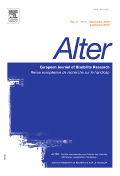
Alter-European Journal of Disability Research
Innovating research to transform socio-economic conditions.Alter-European Journal of Disability Research is a vital academic resource published by the Ecole Hautes Etudes & Sciences Soc-EHESS, Coll France, focusing on the interdisciplinary field of disability research. With an ISSN of 1875-0672 and E-ISSN 1875-0680, this journal serves as a significant platform for the dissemination of research that addresses various aspects of health policy, social sciences, orthopedics, psychiatry, and public health. Despite its cessation of coverage in Scopus after 2021, it retains a respectable presence in the Q3 quartile across multiple categories including Health Policy and Psychiatry. Although lacking open access, the journal continues to attract the attention of scholars looking to bridge the gap between theoretical frameworks and real-world applications. Recognized for its rigorous peer-review process, the journal is especially crucial for researchers and professionals dedicated to improving the socio-economic conditions of individuals with disabilities, making it an essential read for anyone involved in the field.